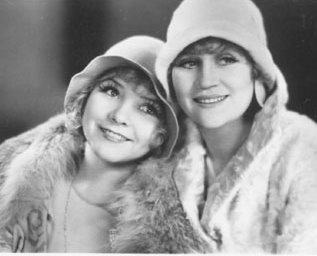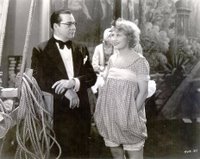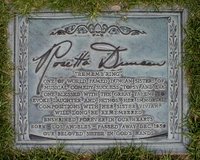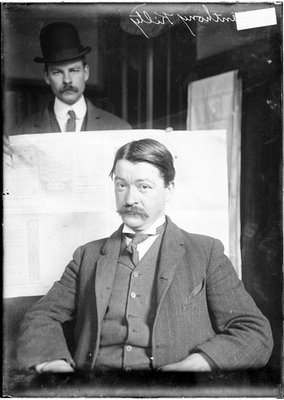The news items that appeared in papers around the world in July of 1924 read like something that could have, and very well may have, caught your eye over yesterday's breakfast: "Noted Celebrity in Slug Fest!," "Struck a Cop!" "Swung Vicious Left to Officer's Head!"
The celebrity involved here was Rosetta Duncan, half of a once wildly popular sister act, The Duncan Sisters... Rosetta and Vivian. Singers, dancers, comedians, musicians. Do it all and do it well actresses. Performers since childhood, stars of vaudeville, Broadway stage and motion pictures (both silent and sound), prolific recording artists spanning the acoustic, electric and LP eras. They'd entertain home front audiences during the first World War, and would still have name power enough to perform for troops during World War II. And, in the waning years of their mammoth career, they'd also appear on television, and even play Las Vegas. In other words, they had the sort of long lived and all encompassing career that most performers can only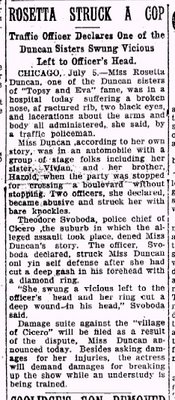 dream of.
dream of.
You don't last that long without hitting a few bumps in the road, and the Duncans were no exceptions. Marriages, both successful and not, highly publicized divorce trials, spats, litigation, hospital stays, auto accidents, and all the usual events that come to most of us without being detailed in news journals. But, for all this, the Duncans always seemed to take it on the chin and bounce back, none the worse for the wear. Although their basic performing style never seemed to change (they continued to interpolate their successful "Topsy & Eva" child characters into all their performances long after it could be carried off convincingly), they appeared to escape criticism because they were always in on the joke and never pretended to offer or be anything else than what they were --- take it or leave it.
Now, let's get back to 1924. You can read all the details in the article to the right from the Lincoln Night Journal of July 5th, but in a nutshell: With Rosetta at the wheel of a car who's contents included her sister Vivian, her brother Harold, and others, they dashed across an intersection in the Chicago suburb of Cicero --- and were stopped by a traffic cop. At this point, what happened next is speculative. 4'11", 104lb Rosetta claimed she was verbally and physically abused by the policeman, who landed a blow to her face. The cop, a strapping 6'2, 225 bloke, in turn, claims it was she who struck him --- gashing his head in the process.
Then as now, there's no such thing as bad publicity, and the Duncans lost no time in inviting photographers from the Chicago Daily News to visit them while Rosetta convalesced. In the photo below, we see brother Harold Duncan (a shadowy figure in their life whom I could find little about) who also seems to have experienced injuries that went unreported in any news account I've read, Rosetta Duncan --- sporting a standard issue concussion bandage along with a bit of plaster tape to the nose, and the entirely unscathed Vivian Duncan.
Rosetta Duncan --- sporting a standard issue concussion bandage along with a bit of plaster tape to the nose, and the entirely unscathed Vivian Duncan.
The case would drag on, with each party embellishing and elaborating until the policeman faced an attempter murder charge --- while, in the interim, the initial traffic violation was dismissed with Rosetta paying a fine of $1 (plus costs) on or around July 16th of 1924.
Here, details as to the ultimate outcome are difficult to ascertain --- but the lack of any further news reports suggests the entire matter was dropped and forgotten.
Or was it?
In a highly contemporary move that would be admired today, the entire debacle was set to music and lyric, with the result being "The (Mean) Cicero Blues," published in November of 1924 and then preserved forever on shellac by the Duncans for Victor Records that same month and year. 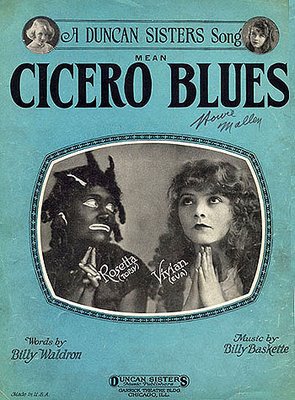
Included in their performing repertoire while the song's newsworthy value remained, "Mean Cicero Blues" exists today as what can be considered a surprisingly forward-thinking example of celebrity exploitation --- turning an unfortunate and rather mundane incident on a quiet street in the Cicero neighborhood of Chicago, into a revenue earning non-sensation.
"Mean Cicero Blues" (1924)
Years pass --- and with them, the news story and song fade into nothingness. By the late 1950's, the Duncans performed sporadically together, but Rosetta plugged on --- the born show-biz trouper personified. Occasionally, a special play date would prompt Vivian to join the act again, as she would do in early December of 1959 at a Chicago night club that featured a nostalgia-themed floor show. The 1920's had become just distant enough as to become nostalgic, and the Duncans were there as living reminders of an earlier day and form of entertainment.
After one of these performances, as Rosetta was driving to a friend's home, she lost control of her car and it crashed into a bridge post --- with Rosetta suffering fatal injuries and dying soon thereafter without ever regaining consciousness.
Although the incident of 1924 was, by every indication, forgotten by the news services, surely Vivian Duncan couldn't help but notice the irony of that her sister's fatal car accident happened to take place in the still quiet suburb of Chicago known as Cicero.
Chicago Daily News Photo #DN-0077122, Courtesy of the Chicago Historical Society
Addendum:
My personal favorite of all the Duncan Sisters' many recordings, "The Argentine, the Portuguese and the Greek," recorded in the U.K. for HMV in 1928. You may find the subject matter odd, or inflammatory... or both, but stick with it until the end and you just may well be as surprised as most listeners are upon hearing it for the first time:
Left: Jed Prouty and Rosetta Duncan in a scene from "It's A Great Life," (MGM-1929)
Right: Rosetta Duncan's grave marker, Forest Lawn Memorial Park, Los Angeles, California
